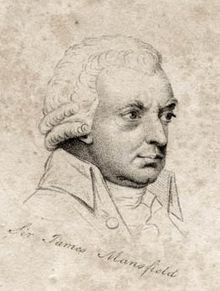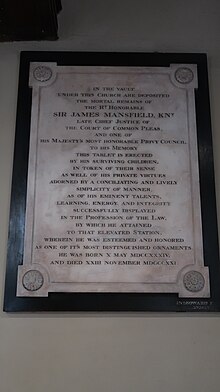James Mansfield
James Mansfield | |
|---|---|
 | |
| Member of Parliament for Cambridge University | |
| In office 1779–1784 | |
| Preceded by | Marquess of Granby |
| Succeeded by | Earl of Euston |
Sir James Mansfield, SL KC (originally Manfield; 10 May 1734 – 23 November 1821) was a British lawyer, judge and politician. He was twice Solicitor General and served as Chief Justice of the Common Pleas from 1799 to 1814.
Early life and career
The son of a
Mansfield pursued a career in law, obtaining admission to the
Mansfield was made
His ability was admired by the
Political career
Mansfield finally did enter the
He went into opposition in April 1782 with the fall of North, and briefly regained the Solicitor-Generalship in 1783 under the
Return to the law
While in Parliament, in 1782, Mansfield had been elected Reader of the Middle Temple, and was Treasurer in 1785. He was counsel in a number of high-profile cases, including the

As a judge, he was principally known for his easily provoked temper, but his knowledge of the law was thought considerable. He refused an offer of the Lord Chancellorship in 1806. As chief justice, he presided over the trial of John Bellingham, assassin of Spencer Perceval, in 1812. Mansfield resigned on 21 February 1814, due to ill health and died at his house in London on 23 May 1821.
See also
References
- ^ "James Mansfield (MNST750J)". A Cambridge Alumni Database. University of Cambridge.
- Davis, Michael T (September 2004). "Mansfield, Sir James (bap. 1734, d. 1821)". Oxford Dictionary of National Biography. required.)
